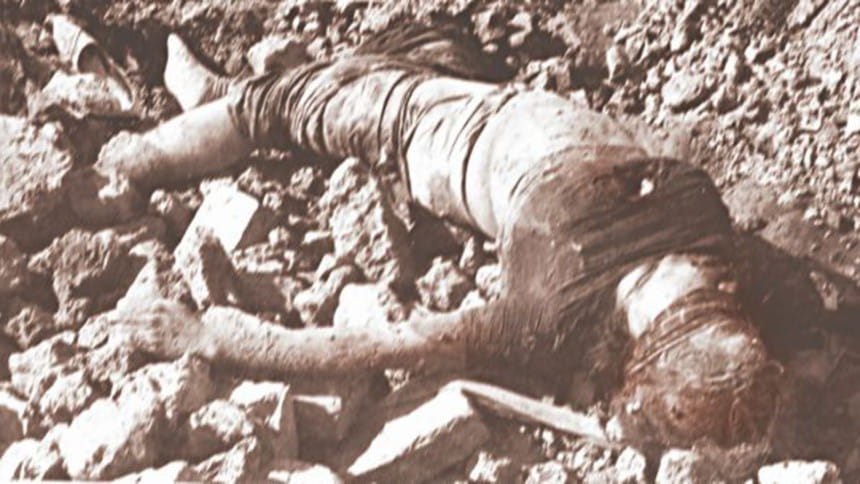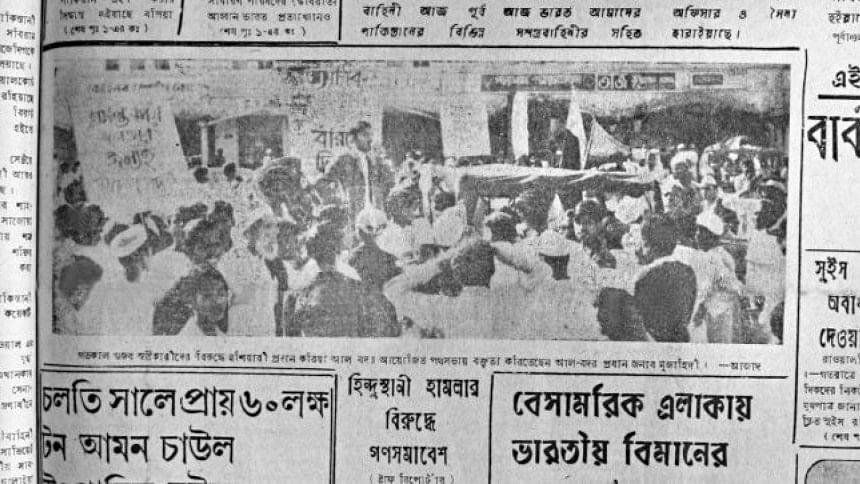Like father, like son

War crimes convict Ali Ahsan Mohammad Mojaheed followed in his father Maulana Abdul Ali's footsteps all along.
In 1971, Abdul Ali was one of the top leaders of the Faridpur Peace Committee, and Mojaheed a top brass of the Al-Badr force.
While his father was the ameer of Faridpur Jamaat-e-Islami during the Liberation War, Mojaheed was the central president of Jamaat's then student wing Islami Chhatra Sangha.
The peace committee and the Al-Badr, two auxiliary forces of the then Pakistani occupation army, committed numerous crimes during the nine-month war.
Following his father's request, Mojaheed had severed his affiliation with Chhatra Union and joined the Islami Chhatra Sangha in 1965. With the passage of time, he became its top leader.
Soon after the war ended, Abdul Ali was arrested for collaborating with the Pakistani army. He was, however, released later, but Mojaheed was still more fortunate.
Not only was he able to dodge arrest and trial, but he also went on to become a top Jamaat leader and even a minister of the country he and his party vehemently opposed during its bloody birth 42 years ago.
And, finally, he was awarded what he deserved, the death penalty.
Son of Abdul Ali and Begum Nurjahan of west Khabashpur in Faridpur town, Mojaheed was born in January 1948. He studied at Faridpur Moijuddin High School and then at Faridpur Zila School. He passed SSC in 1964.
The next year he got admitted to Faridpur Rajendra College and there he joined the Islami Chhatra Sangha.
Mojaheed's father was a provincial assembly member of Pakistan from 1962 to 1964, elected under the banner of Jamaat-e-Islami.
From 1968 until 1970, Mojaheed was the president of Faridpur district unit Chhatra Sangha.

As provincial president of Chhatra Sangha, he also became chief of Al-Badr, the militia force that was in particular responsible for the planned killing of intellectuals at the fag end of the war.
Being the chief of the Chhatra Sangha and Al-Badr, Mojaheed visited many districts and held meetings with his followers to instigate them in annihilating freedom fighters as well as pro-liberation people during the war. He even took part in crimes then, according to the prosecution.
But the defence claimed that as the leader of the Faridpur district peace committee, Mojaheed's father had taken a "strong stance against" the killing, torture and atrocities of the Pakistani army.
Interestingly, the defence documents also stated that Abdul Ali had been treated as a pro-Pakistani and was arrested immediately after the liberation war on allegations of collaborating with the occupation army.
The defence, however, claimed that Abdul Ali was later released with the intervention of Sheikh Mujibur Rahman.
According to the prosecution, after the liberation war Mojaheed had fled to his maternal uncle's house in Narayanganj. He made his come back to politics after the political change in 1975.
He married his maternal cousin in 1973 and started his professional career as the principal of Narayanganj Adarsha School, as per defence documents.
In 1977, he took the MA examination from Chittagong University. He left Narayanganj for Dhaka after Jamaat achieved official recognition as a political party.
He served as the ameer of Jamaat's Dhaka city unit and a member of the party's central executive committee from 1982 to 1989. He remained as the party's assistant secretary general between 1989 and 2000.
On December 8, 2000, he became Jamaat's secretary general, a position he has held ever since.
Mojaheed contested the parliamentary elections of 1986, 1991, 1996 and 2008, but he never won.
Nonetheless, he became the social welfare minister in 2001 in the BNP-led alliance government, drawing huge criticism. He served as a technocrat minister until 2006.
He has long been discharging the role of the chairman of the Daily Sangram and before being arrested, he was the editor of English-language weekly The Rising Sun, according to defence documents.
Mojaheed has three sons and a daughter.
On June 29, 2010, Mojaheed was arrested in connection with hurting the religious sentiments of Muslims. He was shown arrested for war crimes on August 2 that year.
This story was published on July 18, 2013

 For all latest news, follow The Daily Star's Google News channel.
For all latest news, follow The Daily Star's Google News channel. 




Comments